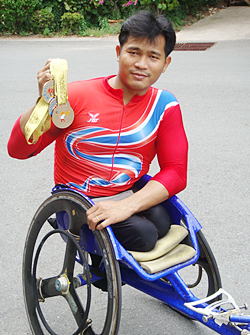While Olympic champions become household names in Thailand, gold medal winning athletes with a disability often remain unknown and do not always receive the same recognition or financial rewards as their able bodied compatriots.
The eyes of the world will look towards London this summer when Queen Elizabeth II presides over the opening ceremony of the 2012 Olympic Games. Of all the sporting events taking place throughout the world, none causes as much interest and excitement as the Olympic Games.
 Supachai Koysub shows a selection of his winning medals from previous Olympic Games.
Supachai Koysub shows a selection of his winning medals from previous Olympic Games.
Viewers from the richest and poorest nations will be transfixed to their television screens, cheering their compatriots and hoping that their athletes will win the most prized of sporting prizes, an Olympic gold medal. After seventeen days of triumphs and heartache the Olympic flame will be extinguished, the lights will fade and the athletes will return home.
Thailand has only won seven gold medals at past Olympic Games, and weightlifter Prapawadee Jaroenrattanatarakoon and boxer Somjit Jongjohir both became household names after winning gold in Beijing 2008. All Thai athletes will be hoping and praying that they are selected for London and that all their hard work pays off and they too can return home from London carrying a medal.
But less than three weeks after the Olympic closing ceremony, the stadium in East London will once again welcome athletes from around the world. The torch carriers will light the cauldron and athletes will compete for gold at the 2012 Paralympic Games.
Thai athletes competing at recent Paralympic Games have won more gold, silver and bronze medals than their able bodied countrymen and yet the names of these athletes often remain unknown.
One such athlete is Supachai Koysub. A native of Chaiyaphum province, Supachai contracted polio at an early age which left his legs severely weakened. At the age of seventeen he travelled to Pattaya and enrolled at the Redemptorist Vocational School for People with Disabilities. It was here that Supachai was first introduced to athletics, in particular wheelchair racing.
A year later he competed in his first ever wheelchair race at the National Games for the Disabled and surprisingly he won a silver medal.
At the age of twenty three Supachai was selected to represent Thailand at the Sydney 2000 Games.
An unknown athlete, he was not expected to feature on the winner’s podium, and in the 100m wheelchair racing final he lost out on a bronze medal by one hundredth of a second.
In the first heat of the 200m he came second to Swedish athlete Hakan Ericsson, who broke the world record. However in the final race Supachai passed Ericson, won the gold medal and broke the world record, finishing with a time of 25.01.
Supachai also went on to win a second gold medal in the 4x100m race and silver in the 4x400m race. On arriving back to Pattaya he continued with his work as a teacher at the Vocational School, but all his free time was committed to training.
Four years later he travelled to Europe for the 2004 Athens Paralympic Games and won two gold medals in the 4x100m and 4x400m wheelchair race, both times helping his team mates break the world record.
At the Beijing 2008 Games Supachai won two silver and one bronze medal, and he is hoping to do better later this year when he represents Thailand at his fourth Paralympic Games in London.
Currently at a training camp in Korat, Supachai, along with his fellow athletes, is training as hard as his body will allow. A team of coaches, physiotherapists, nutritionalists and psychologists are working together to ensure each athlete is in his or her peak condition. Ranked number two in the world, Supachai is one of the favourites to win a medal in London.
While national TV networks will be dedicating whole channels and many hours of coverage each day to the Olympic Games, it is unlikely that the Paralympic Games will receive as much air time.
There will not be as many spectators watching the Games in the Olympic Stadium. The number of television crews will be reduced and the results of the Paralympic Games will take up a minimum of inches in the newspaper columns.
If an able bodied Thai athlete returns to Thailand from London later this year carrying a gold medal, they will be met at the airport by fans, photographers and film crews. They will make headline news, their photo will appear on the front pages of the Thai and English newspapers and they will receive a generous financial gift from the government. If Supachai, who is currently ranked number two in the world of 200m wheelchair sprinting, brings home a gold medal, the likelihood of him being mobbed by the media at Suvarnabhumi is small.
Athletes with disabilities work as hard, if not harder than an able bodied athlete. These athletes have won more gold medals than their non-disabled compatriots and yet they receive less coverage, little support and on average just half of what an able bodied athlete receives in prize money from the government.
But for Supachai it is not about the money. At the age of thirty five many athletes will be thinking about retirement, but Supachai is already looking ahead to the 2016 Games which will be hosted in the Brazilian city of Rio de Janeiro. But before thinking too much about participating in his fifth Paralympic Games, he has to prove in London that he is still a force to be reckoned with.




